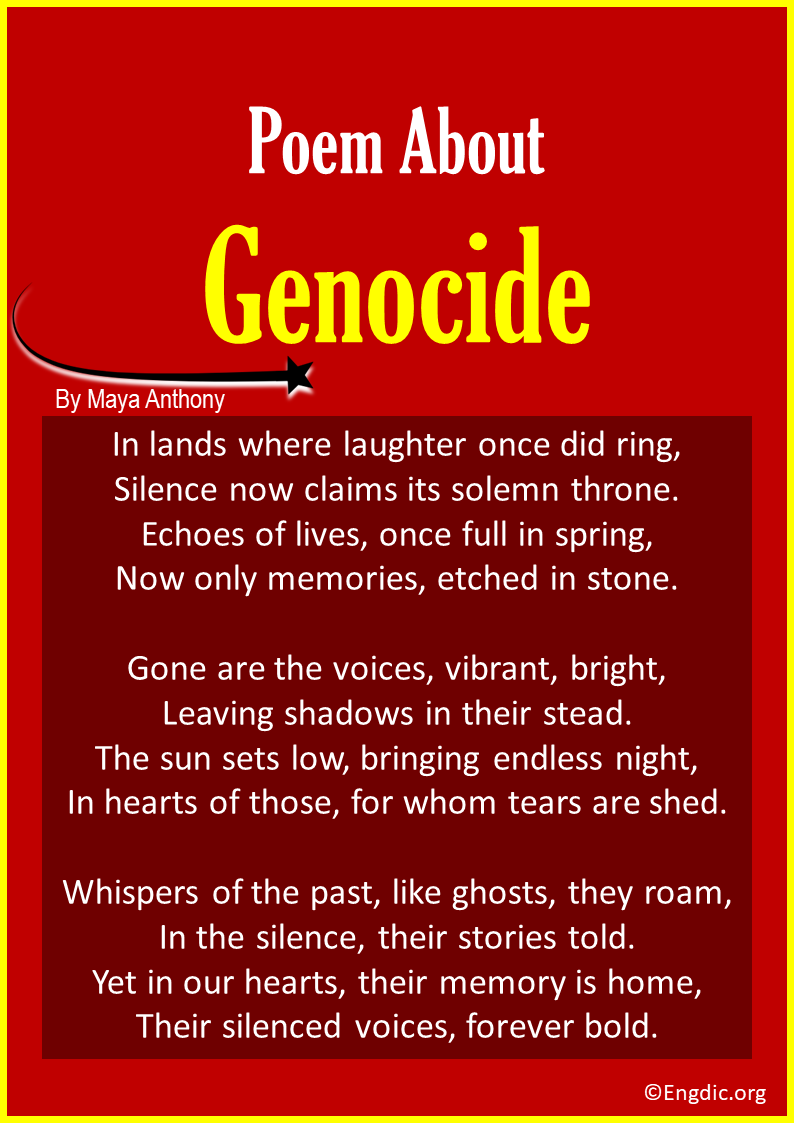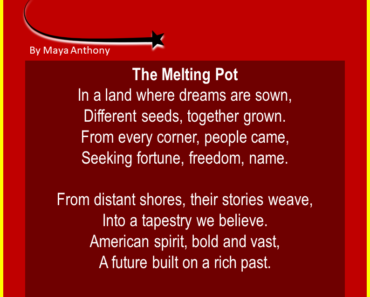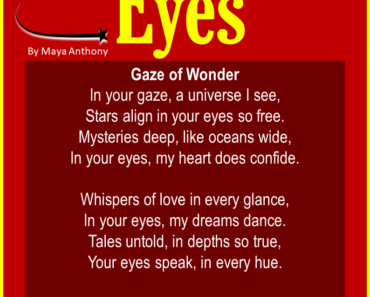Exploring the profound impact of genocide through poetry, this collection unveils ten short poems. Each piece delves into the deep emotions and tragic realities of such atrocities. Simple yet powerful, these poems offer a voice to the voiceless, reflecting on loss, pain, and the resilience of the human spirit.
Short Poems About Genocide
1. Echoes of Silence
This poem captures the haunting silence left in the wake of genocide. It speaks to the void where once there was life, and the echoes of those now gone.
In lands where laughter once did ring,
Silence now claims its solemn throne.
Echoes of lives, once full in spring,
Now only memories, etched in stone.
Gone are the voices, vibrant, bright,
Leaving shadows in their stead.
The sun sets low, bringing endless night,
In hearts of those, for whom tears are shed.
Whispers of the past, like ghosts, they roam,
In the silence, their stories told.
Yet in our hearts, their memory is home,
Their silenced voices, forever bold.
2. Tears of History
This poem reflects on the deep sorrow and the indelible marks left by genocide on history. It is a lament for the lost lives and a reminder of the tragic past.
Tears fall like rain from history’s eyes,
Mourning souls lost, under cruel skies.
Each drop a life, each life a tale,
In history’s heart, forever pale.
The world turns, yet the pain remains,
Echoing through time’s endless plains.
Voices silenced, dreams torn apart,
Leaving scars on the world’s heart.
Yet through tears, hope dares to rise,
Against the pain, against the lies.
In memory of the fallen, we stand,
Holding peace in our trembling hand.
3. Shadows of the Forgotten
This poem speaks to the forgotten victims of genocide, whose stories often remain untold. It is a tribute to their existence and a call to remember them.
In the shadows, forgotten lies,
A tale of sorrow, under the skies.
Faces nameless, voices unheard,
Their silent screams, a haunting word.
Lost in the echoes of the past,
Their memories, in shadows cast.
Yet each shadow tells a story,
Of lost dreams, stripped of their glory.
We remember the shadows, deep and long,
In their silence, we find our song.
A pledge to honor those unseen,
In their memory, our conscience clean.
4. Whispers in the Wind
This poem is about how the remnants of genocide are carried through the wind, serving as a reminder of the past. It symbolizes the ever-present nature of history’s whispers.
Whispers in the wind, they softly speak,
Of lives once vibrant, now rendered meek.
Carrying tales of sorrow and pain,
In the breeze, their spirits remain.
The wind tells stories, old and grim,
Of light extinguished, on a whim.
Yet in its howl, a defiant cry,
For those who were not ready to die.
Listen close to the whispering wind,
In its message, our truths we find.
A call to remember, and never forget,
The souls in the wind, our eternal debt.
5. Echoes of the Lost
This poem discusses the lingering presence of those lost in genocide, echoing through time and space. It emphasizes the immortality of their spirits in our collective memory.
Echoes of the lost, in time they ring,
Their voices, a timeless, haunting sing.
Through years and decades, they resonate,
In their echoes, their fates we contemplate.
Each echo, a story untold,
A life, a dream, in history’s hold.
Their whispers, in the air, they weave,
In their echo, we grieve and believe.
In the echoes, we find a trace,
Of the lost, in time’s embrace.
Their spirits, in echoes, forever last,
A bridge connecting present and past.
6. Rivers of Sorrow
Rivers of Sorrow metaphorically represents the ongoing flow of grief and sadness left by the acts of genocide. It is a reminder of the continuous impact on the lives affected.
Rivers of sorrow, through time they flow,
Carrying tales of anguish and woe.
Each wave a tear, each tear a life,
In their waters, reflected strife.
Flowing endless, through heart and soul,
Their currents deep, beyond control.
In their depths, lost dreams do sleep,
In their sorrow, the world does weep.
Yet in these rivers, strength is born,
Against despair, a new hope dawn.
In their flow, we find our way,
To bring light to each new day.
7. The Silent March
The Silent March depicts the unseen, yet powerful, movement of those affected by genocide. It is a testament to their unspoken resilience and enduring spirit.
In silence, they march, the unseen throng,
Their steps unheard, yet oh so strong.
Each footstep, a tale of survival,
Against the darkness, their silent rival.
Through the void, they march with grace,
Leaving footprints, time can’t erase.
In their journey, a silent plea,
For the world to listen, to see.
This silent march, through history’s lane,
A testament to enduring pain.
Yet in their silence, a strength untold,
In their steps, their stories unfold.
8. Ashes of Dreams
Ashes of Dreams symbolizes the destruction of aspirations and hopes that genocide brings. It is a poignant reminder of what is lost beyond lives – the dreams of individuals.
In the ashes of dreams, we find despair,
Lost hopes, scattered everywhere.
Each ash, a dream once bright,
Now extinguished, lost to night.
Smoldering embers of what could be,
Turned to ashes, no longer free.
In their grayness, a silent scream,
For lost futures, now but a dream.
Yet in these ashes, a spark remains,
A hope that endures, through the pains.
From the ashes, new dreams arise,
In their rebirth, our future lies.
9. The Unseen Tears
The Unseen Tears delves into the internal suffering that genocide causes, often hidden from the world. It speaks to the private grief that remains unseen but deeply felt.
Unseen tears, in the night they fall,
Silent cries, behind the wall.
Hidden from view, yet deeply felt,
In their quietude, hearts do melt.
Each tear, a story of pain,
Unspoken, in the night’s domain.
Yet in their silence, a strength is found,
In their depths, resilience is bound.
These unseen tears, though invisible,
Hold a power, indivisible.
In their quiet, a loud echo,
Of the pain, the world must know.
10. Voices in the Void
Voices in the Void reflects on the unheard voices of genocide victims. It emphasizes the importance of listening to these voices, even if they seem lost in the void.
Voices in the void, calling out,
Their words, a whisper, a silent shout.
Unheard, unseen, yet ever present,
In the void, their plea is incessant.
Each voice, an echo of a lost life,
Cut short by strife, by sharpened knife.
Yet in the void, their words do linger,
Pointing at us, an accusing finger.
Listen close to the void, and hear,
The voices of those we should hold dear.
In their whispers, a lesson taught,
In their silence, our conscience caught.
Explore More Poems:







